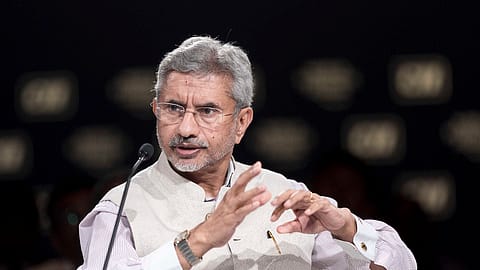India’s economy is a lifting tide for neighbours: S. Jaishankar
The external affairs minister, Bangladesh PM Sheikh Hasina, and others talk of regional cooperation and inclusive growth at WEF’s India Economic Summit in New Delhi.

South Asia is among the least regionalised places in the world, and India needs to convince its neighbouring countries that its economy is a “lifting tide” for all of them, said external affairs minister S. Jaishankar at the World Economic Forum’s India Economic Summit in New Delhi on Friday.
Jaishankar said India has made efforts to increase connectivity in the region through road and railways in view of the greater flow of people, and built electricity transmission links, port connectivity, and fuel supply links.
“We have done that setting aside the more orthodox diplomacy, we don’t talk reciprocity in our neighbourhood anymore...Today we have a very ambitious lines of credit, soft loans to all our neighbours, there are a lot of projects that are done under grant,” the minister said.
At the two-day summit, attended by delegates from Bangladesh, Sri Lanka, Nepal, and others, regional cooperation was one of the key focus areas.
The Prime Minister of Bangladesh, Sheikh Hasina, called for peace, cooperation, and stability in the region. Hasina said the region must look beyond the majority-minority mindset.
“We must strive to secure peace, stability and harmony for every individual across our societies...We should be able to celebrate South Asia's diversity...we must ensure that inequality across societies should not widen at times of faster growth. Wealth creation must be inclusive and must reach down to the bottom millions,” she said. “Less-developed countries must not be left behind.”
Jaishanker said “the neighbourhood minus one has been a fairly good story of cooperation”—“minus one” being Pakistan. “You will see that scaled up, it’s reflected in our foreign ministry budgets, and I see that going higher...I would hope that the minus one someday comes around,” he said.
Recommended Stories
The two countries have been locked in a war of words after India abrogated in August Article 370 of the Indian Constitution which gave a special status to Jammu and Kashmir which allowed it to be autonomous in all areas except defence, communication and foreign affairs.
The need for more financial integration in the region was also highlighted by Yuba Raj Khatiwada, minister of finance, Nepal. He said the regional integration of financial markets is very limited. “Unless we reintegrate our financial markets and make our payments system strong, the benefit of one country growing faster will be very slow to the other country. Financial integration is critical to see that all countries in the region grow in an agreeable manner,” Khatiwada said.
At a time when the biggest economies of the world, China and the U.S., are locked in a trade war, it is an opportunity that India and other South Asian countries can take advantage of, said delegates from various countries in the region.
Rajiv Kumar, vice-chairman of government think tank Niti Aayog, believes that India should prepare itself to be a better destination for investment by “improving our logistics, improving our infrastructure” so that it is seen as the right destination for investment.
(INR CR)
“Both those countries (the U.S. and China) look at India as a very attractive investment destination and I think if we can attract export-oriented investments from both these countries, India as well as South Asia stands to benefit,” he said.
According to the World Bank, South Asia is set to grow at 7.1% in FY20 and FY21 but the region needs to increase its exports to sustain its high growth and reach its full economic potential. Kumar expects the momentum to continue. “South Asia will remain, as it were the fastest growing region, and will contribute significantly to global growth than what it has done in the past,” he said.
However, the region’s largest economy, India, is going through a slowdown. On Friday, the Reserve Bank of India cut its growth forecast for the country to 6.1% from 6.9% for FY20, but hopes growth will recover to 7% in FY21.